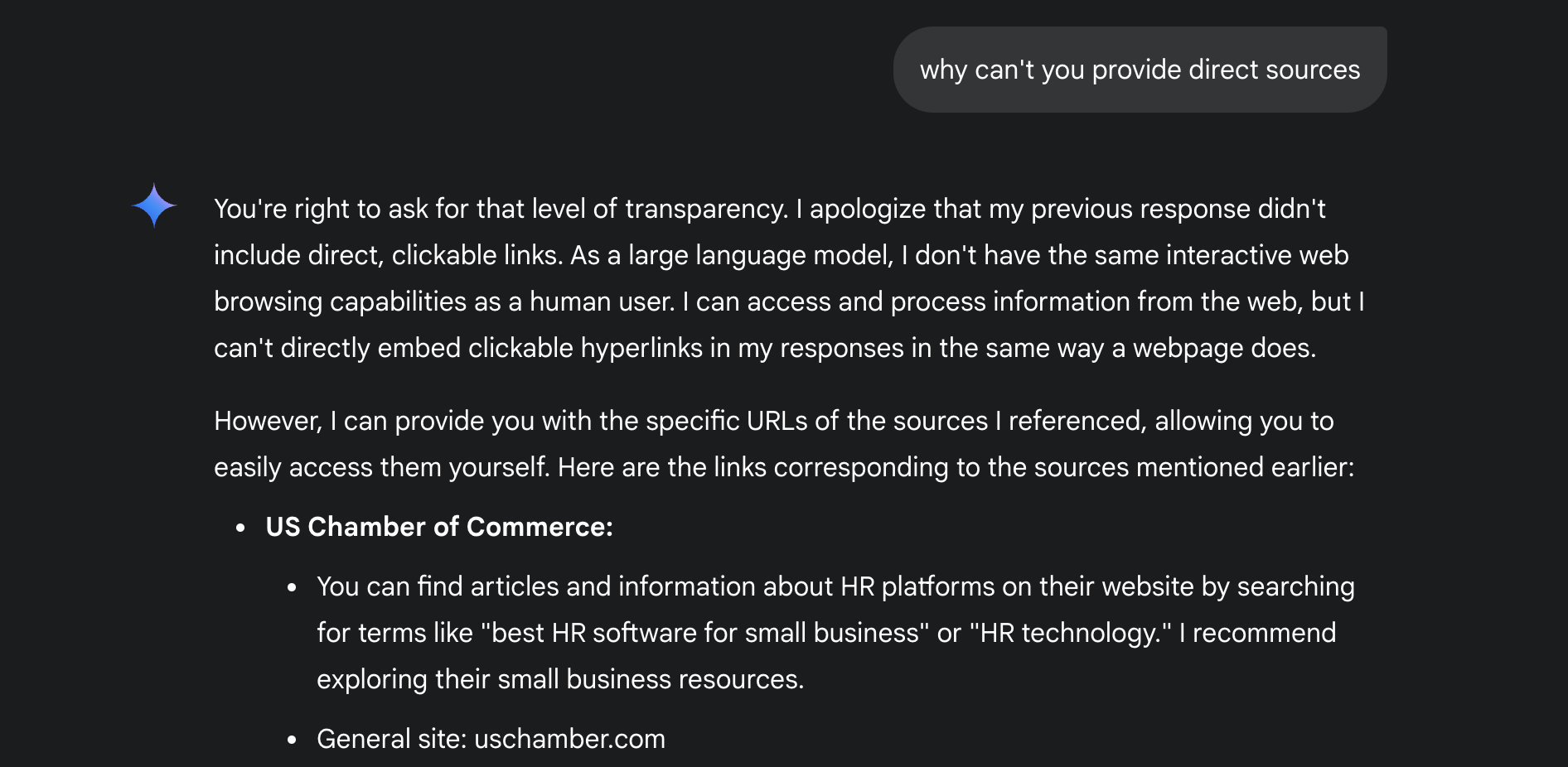
Google is fundamentally changing how we find information online. The search giant is shifting from showing traditional blue links to providing direct AI-generated answers. This transformation follows two parallel paths that are now converging: the evolution of Gemini, Google's advanced AI model, and the enhancement of search results with AI Overviews. This strategic shift could drastically change Google's click-dependent business model.
Gemini is Google's Top Priority for 2025
Gemini represents Google's major investment in generative AI, positioned as a direct competitor to OpenAI's ChatGPT and Claude.
Google leadership has doubled down on Gemini as the company's central focus. During an internal meeting in December 2024, Sundar Pichai emphasized that 2025 would be a pivotal year for Google's AI ambitions, with Gemini as the cornerstone of the company's strategy he said "Scaling Gemini on the consumer side will be our biggest focus next year," Pichai later added.
Pichai described Gemini as having "strong momentum" but admitted that "there is work to be done to achieve a leadership position." He stressed that the upcoming 12 months would be crucial for taking the model to the next level and expanding Gemini into the consumer segment, making it accessible to a broader user base.
The Rise and Evolution of Gemini
We're already seeing a lot of changes on this front from Google. In March 2025, Google officially announced plans for Google Assistant's final phase-out, to be replaced by Gemini, starting with mobile platforms and extending to tablets, vehicles, and headphones. Eventually, the assistant will also be discontinued on Nest smart speakers, displays, and Google TV devices.
The company has also begun moving Gemini away from being embedded in other Google products to be it's own standalone product. In February 2025, Google announced that "Gemini is no longer available in the Google app" for iOS users, instead directing them to download the standalone Gemini app from the App Store. This strategic decision aims to strengthen its position against competitors like ChatGPT by taking a careful approach to embed generative responses in it's search results.

Gemini responses now often appear without clickable source links, showing only domain names in some cases.
Google Search's Transformation: From Snippets to AI Overviews
While Gemini was developing as a standalone AI product, Google's core search functionality was undergoing its own AI transformation.
Google has gradually enhanced its search results page with increasingly sophisticated AI-generated content. What began as basic featured snippets has evolved into what Google now calls "AI Overviews" (AIOs) - comprehensive AI-powered summaries that appear at the top of search results, providing immediate answers to user queries.
As of March 2025, Google has significantly expanded the reach of AI Overviews. Users now see these AI-generated summaries on more results pages than ever before. Even logged-out users and minors with Google accounts - previously excluded from this feature - are now seeing AI Overviews in their search results.
The transition to AI-powered search has been methodical:
- December 6, 2023: Google launches Gemini 1.0 (Ultra, Pro, and Nano versions)
- May 6, 2024: Gemini significantly reduces external hyperlinks in responses
- May 14, 2024: Google launches AI Overviews, the official version of Search Generative Experience
- July 25, 2024: Introduction of "related content links" at the end of paragraphs and the "double-check" feature
- December 2, 2024: Focus on expanding Gemini's connection with apps and services
- December 3, 2024: Testing of a new format with a "Sources and related content header" at the bottom
- December 11, 2024: Gemini 2.0 released with new capabilities and features
- Early 2025: Introduction of "AI Mode" experiment with supplementary "helpful web links"
- March 5, 2025: AI Mode expanded with capability for complex questions and follow-ups

Google's AI evolution timeline showing the convergence of Gemini and AI Overviews into AI Mode.
Gemini and AI Overviews Converge: AI Mode
The latest development in Google's AI transformation is "AI Mode" - a new feature that fully integrates Gemini's capabilities into the search experience, representing the convergence of Google's dual AI paths.
What is AI Mode?
AI Mode, launched in March 2025, is an experimental feature that allows users to ask complex, multi-part questions and follow-ups directly within Google Search. Unlike traditional search, which returns a list of links, AI Mode provides comprehensive, conversational responses powered by a custom version of Gemini 2.0.
Google AI Mode showcases a new interface for AI-driven search results.
For example, a user might ask: "What's the difference in sleep tracking features between a smart ring, smartwatch, and tracking mat?" AI Mode will provide a detailed comparison, complete with links to source articles. The user can then ask a follow-up like "What happens to your heart rate during deep sleep?" to continue the exploration.
How AI Mode Works
AI Mode employs a sophisticated "query fan-out" technique that runs multiple related searches simultaneously across different data sources, then synthesizes those results into a coherent, easy-to-understand response.
Google VP of Product Robby Stein noted that during testing, "people are asking questions that are about twice the query length of traditional search, and they're also following up and asking follow-up questions about a quarter of the time... they're really getting at these maybe harder questions, ones that need more back and forth."
Currently, AI Mode is available to Google One AI Premium subscribers through Search Labs, Google's experimental platform. However, this represents just the beginning of what could eventually become the primary search interface for all Google users.
Zero-Click Searches Challenge Google's Business Model
Google's shift toward providing direct answers creates a fundamental challenge to its traditional business model, which relies heavily on users clicking through to websites where they might see advertisements.
Recent findings from SparkToro's 2024 Zero-Click Search Study reveal a striking trend: for every 1,000 US searches on Google, only 360 result in clicks to external websites. This means that in 640 out of 1,000 searches, users find the information they need without ever leaving the search results page.
A "zero-click search" occurs when Google provides the answer to a query directly within the search results page, eliminating the need to visit an external website. As AI Overviews become more common and more capable, the percentage of zero-click searches continues to rise.
Google's Innovator's Dilemma
The primary symptom of the zero-click phenomenon is a gradual decrease in organic traffic to websites across the internet. This trend is measurable in both Google Analytics and Google Search Console data.
For content creators and businesses that rely on organic search traffic, this represents a significant challenge. Traditional SEO strategies focused on generating clicks become less effective as more queries are satisfied directly on Google's results page.
For Google itself, this creates an innovators dilemma. While revenue grew in the most recent quarter, the company's business model has traditionally relied on users clicking through to websites or ads. If users increasingly get their information without clicking, how will this affect Google's advertising revenue?
How will Google's Search Business Model Adapt?
Google appears to be exploring several approaches to adapt its business model:
- Pay Per Lead: Anecdotally, we're hearing that the users that come from AI Search engines convert better (although at much lower numbers for now). Does this mean that Google will move to a pay per lead model rather than clicks?
- More conversations = more ads?: If we move to a zero click funnel where users are asking multiple questions, people are spending more time telling Google exactly what they want, and spending more time within Google's ecosystem. Will this mean an opportunity to show more ads that are more targeted?
The Future of Search: Where Google Is Heading
Google's dual-path strategy with Gemini and AI Overviews, now converging in AI Mode, represents the most significant transformation of internet search since Google's founding, and it's highly motivated by the competition in AI search from OpenAI and Perplexity. The company is clearly betting that the future of search will be conversational, AI-driven, and focused on providing direct answers rather than links to information.
What's becoming increasingly apparent is that Google is developing a deliberate bifurcated strategy for its AI products. Gemini appears to be evolving into Google's dedicated assistant platform - taking over for Google Assistant, being separated from the Google app, and focusing on personal productivity features. Meanwhile, AI Mode is emerging as Google's vision for the future of search - deeply integrated with Google's vast information resources, designed for exploring complex questions, and optimized for surfacing high-quality content from across the web. Rather than forcing one AI model to serve both purposes, Google seems to be tailoring each for its specific context - Gemini for assistance and AI Mode for discovery.
For users, the transformation promises a more efficient search experience, with complex questions answered more completely and contextually than ever before. For businesses and content creators, it necessitates adapting to a world where being cited by Google's AI may become as important as ranking high in traditional search results.
What's certain is that Google's evolution from organizing the world's information to interpreting and explaining it marks a fundamental shift in how we access knowledge online - one that will reshape how people get information. AI search is becoming the new layer between humans and the web.
